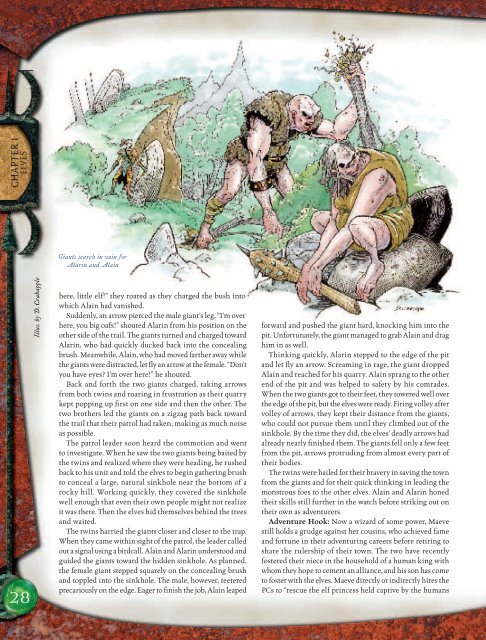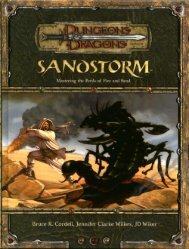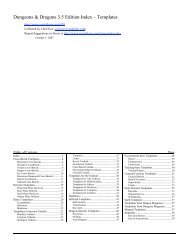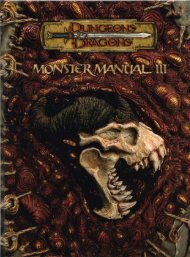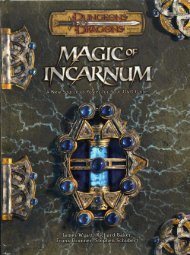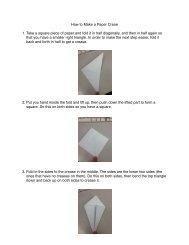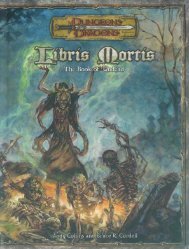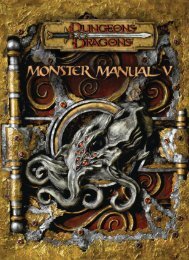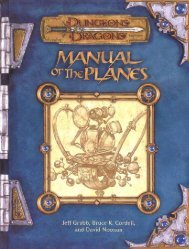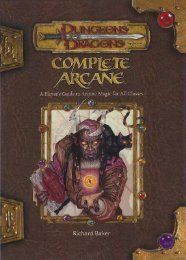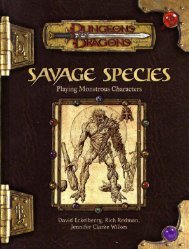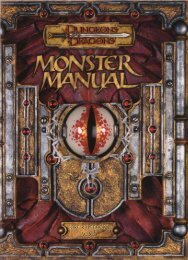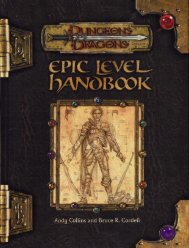CHAPTER 2HALFLINGS54to tell how long a given tradition has been in force. If thehalflings know <strong>of</strong> such information, they do not tell.No one knows exactly when the first halflings appeared,but legend holds that they were the last race created—evenafter humans. Whether or not their creation story andother legends handed down from parent to child are true,they explain much about why halflings feel the need to beconstantly on the move, and how a touch <strong>of</strong> larceny came tobe deeply rooted in the halfling soul.Roleplaying Application: Halflings are inordinatelyfond <strong>of</strong> stories, and most know enough to entertain theirfellows for years on end. What is your character’s favoritelegend? Is there a legendary character that inspires him?Does he plan to create new legends <strong>of</strong> his own, based onhis personal exploits?MYTHIC ORIGINSIn the days when the world was still young, after the FirstWar that spilled the blood <strong>of</strong> so many divine beings, the godsbegan to create mortal races in their own images. First camethe elves, who laid claim to the forests and seas, and then thedwarves, who took the hills, mountains, and underground.(Perhaps it was the other way around; the elves and dwarveshave never agreed about who was first.) Next came the bestialorcs, and then the humans. Still, Yondalla had created nopeople <strong>of</strong> her own. Instead, she traveled the world over andwatched the creatures the other gods had created, determinedthat hers would be the best.She saw the fey folk—satyrs, sprites, dryads, and otherdwellers in the woodlands. These creatures displayed azest for life and a curiosity about new things that charmedthe goddess entirely. Many <strong>of</strong> them also had the benefit <strong>of</strong>a compact size that made them seem innocuous to largercreatures and helped them to avoid danger. However, theywere frivolous creatures who feared larger beings. Therefore,with some regret, Yondalla left them and traveled on.Next she visited the elves, who were frail and beautiful,but oh so haughty. They had a freedom <strong>of</strong> spirit that Yondallamuch admired, and a grace and agility that put other creaturesto shame. To top it all <strong>of</strong>f, their beauty was near to that <strong>of</strong>Corellon Larethian himself. Still, they took too long to doanything; Yondalla itched for action, and there was little tobe had in their towns. So on she traveled.Next she visited the dwarves in their cities below themountains. Such pride in family and home she had neverseen before, and it pleased her; for what would a mortal bewithout a family? Who would remember him when he wasgone? Still, the dwarves were sour folk, given to drudgery.Who could really be happy toiling away in the bowels <strong>of</strong> theearth, confined by rock and stone, never knowing the joy <strong>of</strong>the open air and the beautiful land? So she took up her shieldand continued on her way.Next she found the orcs, and oh how dreadful they seemed.So brutal and fierce they were, filling their short lives withrage and combat. Still, she was fascinated by their boldness.These creatures showed almost no fear <strong>of</strong> their enemies, <strong>of</strong>death, or <strong>of</strong> any hardship. However, no good could come <strong>of</strong>such brutality, and Yondalla did not tarry in their realms.Next she came to the humans, and here she found muchto admire. These creatures were strong and clever, brave andquick, and flexible enough to adapt to any circumstance.Indeed, they were so flexible that no two <strong>of</strong> their settlementswere alike. Such diversity was surely a fine thing,but they seemed oddly given to warring with each otherover the very differences that made them able to survive indifferent places. They spread so fast—why, they had nearlytaken over the plains she had chosen for her people, not tomention shares <strong>of</strong> the forests, seas, and mountains that theother gods claimed.After her journey, Yondalla returned to her home andthought about what she had seen. Each <strong>of</strong> the mortal raceshad a quality she wanted for her race, but each also had manyfaults. With this realization came a decision: She wouldtake a bit <strong>of</strong> each race’s essence and mold them into a newbeing—one that had all the qualities she admired in each <strong>of</strong>the other races.The following night, she crept through the forest and seizeda pixie to use as the vessel for her new creation. Silencing thecreature with magic, she crept on to the settlement <strong>of</strong> the elves,where she drained a bit <strong>of</strong> their agility and infused the pixiewith it. The creature grew several inches, and Yondalla had tobind it to keep it from dancing away. Moving belowground tothe city <strong>of</strong> the dwarves, Yondalla drained <strong>of</strong>f a small amount <strong>of</strong>their devotion to family and clan and infused the pixie withthat. The pixie grew still more, and its wings shriveled as itsfeatures became less delicate. Its frantic movements slowed,and it clung to her as though to a mother. Then she moved onto the orc encampment, where she drew <strong>of</strong>f some <strong>of</strong> the orcs’boldness and infused the pixie with that. The pixie grew yetagain and began to look about for some trouble to get into.Before it could find any, the goddess hurried <strong>of</strong>f to the nearesthuman city and drained the essence <strong>of</strong> these highly adaptablebeings. A dose <strong>of</strong> this draught caused the pixie to grow a bitmore and release its hold on Yondalla.The goddess surveyed her handiwork and was pleased.The creature that stood before her was about 3 feet tall andperfectly proportioned. His wide, blue eyes shone with curiosityand an utter lack <strong>of</strong> fear. His slim, agile form radiatedvitality and grace. When he picked up some wood and sharprocks and began to fashion a wheel, Yondalla knew that shehad created the perfect mortal creature.The other gods, however, were not so pleased when theydiscovered that Yondalla had tapped their creations anddrained portions <strong>of</strong> their essence. The elves were now not asagile as they had been, the orcs showed a bit <strong>of</strong> fear at times,and the dwarves sometimes left their clan homes. As for thehumans, they slowed their technological advances and theirspread into different lands.Yondalla flattered the other gods and praised their creations.“Why should I try to duplicate perfection itself?” shecried. “I only took a bit <strong>of</strong> each, after all. There was more thanenough <strong>of</strong> each virtue for the other races and mine as well.”
Slightly mollified, the other gods nevertheless decreed thatYondalla must be punished for her crime. They ruled thather people, whom she named the halflings, could have nolands <strong>of</strong> their own. Always would they wander, and theirwelcome in the lands <strong>of</strong> others would be on their ownmerit alone. Yondalla agreed.Furthermore, they decreed that Yondalla mustexpunge the larcenous streak in her own being thathad caused her to steal the essences <strong>of</strong> the other gods’creations. So Yondalla clove <strong>of</strong>f the portion <strong>of</strong> herselfthat espoused thievery, secrets, vengeance, and otherdark thoughts, leaving only the purest goodness andvirtue. The dark portion <strong>of</strong> Yondalla took on a formthat resembled her own and faded into the background,where it would remain ever after as a separategoddess called Dallah Thaun—bound to Yondalla butseparate. Yondalla stepped forward, and the gods foundno fault with her new character.Ever since, halflings have wandered the earth butcalled no place home. They have worshiped a dualgoddess while claiming to revere only one.CHAPTER 2HALFLINGSLEGENDSHalfling culture is replete with stories. Every halflingwants to make his mark and become the stuff <strong>of</strong>legends, and many succeed. Every family has storiesabout the exploits <strong>of</strong> various uncles, aunts, cousins,grandparents, and other relatives. Every clan has talesabout its famous members. In addition, the race as awhole has legends about the halfling gods and thebest-known heroes <strong>of</strong> the race.Halflings tell their tales under the stars when theycamp at night, in the wagons to pass the time whilethe landscape rolls by, and in the taverns and inns<strong>of</strong> other lands. All halfling legends are entertaining,and most praise the wit, warmth, and deftness <strong>of</strong> thehalfling race.The following are some <strong>of</strong> the most popular halflinglegends ever told. All are considered true—or at leastmore true than those <strong>of</strong> any other race.Silinda and the King <strong>of</strong> ArendalLong ago, in a caravan that roamed the whole <strong>of</strong> thecontinent, lived a young halfling named Silinda.Fair <strong>of</strong> face and lithe <strong>of</strong> form, Silinda set <strong>of</strong>f to findadventure on her twentieth birthday, after turningdown several <strong>of</strong>fers <strong>of</strong> handfasting.She left with only a change <strong>of</strong> clothing, a blanket,her trusty sword, the thieves’ tools that her aunthad fashioned for her, some salve for wounds, andenough food for one day. She had no fear <strong>of</strong> starvingor misfortune, only a wide-eyed wonder at the worldthat stretched before her.After walking for a few hours, Silinda heard a plaintivecry. “Help me!” called a voice from the woods she waspassing. Silinda moved as quickly as she could throughYondalla visits the elves and finds them too flightyIllus. by E. Fiegenschuh55
- Page 2:
C R E D I T SD E S I G NSKIP WILLIA
- Page 7 and 8: no elf could predict which memory w
- Page 9 and 10: premium. Thus, each individual can
- Page 11 and 12: The elves have raised one form of e
- Page 13 and 14: do spend time away from one another
- Page 15 and 16: espects during this time, and those
- Page 17 and 18: Stores Master: Charged with keeping
- Page 19 and 20: would be the birthright of any full
- Page 21 and 22: of feet above the forest floor. Mos
- Page 23 and 24: Cleric Training: More than any othe
- Page 25 and 26: ELF HISTORYAND FOLKLOREThe elves cl
- Page 27 and 28: along with her son Hionyron, who wa
- Page 29 and 30: and return her to her people.” In
- Page 31 and 32: Table 1-3: Suffixesd% Suffix Meanin
- Page 34: CHAPTER 1ELVES34tri-level tree home
- Page 37 and 38: Illus. by C. Lukacsurious and activ
- Page 39 and 40: the reason for the farmer’s hospi
- Page 41 and 42: Halflings make a visitor feel welco
- Page 43 and 44: Halflings are usually pleasant trav
- Page 45 and 46: Halflings are as eager to experienc
- Page 47: A chief or elder heads each clan, c
- Page 50 and 51: CHAPTER 2HALFLINGS50away from their
- Page 52 and 53: CHAPTER 2HALFLINGS52Illus. by S. Wo
- Page 56 and 57: CHAPTER 2HALFLINGS56the underbrush
- Page 58 and 59: CHAPTER 2HALFLINGSIllus. by T. Baxa
- Page 60 and 61: CHAPTER 2HALFLINGS60Donta muden sit
- Page 63 and 64: and one or more bedrooms. All have
- Page 65 and 66: Illus. by C. Lukacshe cliff-dwellin
- Page 67 and 68: Personality: Raptorans have a reput
- Page 69 and 70: PSYCHOLOGYSome outsiders who have h
- Page 71 and 72: for making a point through a logica
- Page 73 and 74: flock for debate, sometimes invitin
- Page 75 and 76: its eggs. At such times, they toler
- Page 77 and 78: THE RAPTORAN PANTHEONThe typical ra
- Page 79 and 80: Prayers: Prayers to the Stormfather
- Page 81 and 82: “Welcome, friend,” said a human
- Page 83 and 84: year since, and they share the care
- Page 85 and 86: D: Domain spell. Domains: Protectio
- Page 87 and 88: characteristics are summarized in t
- Page 90 and 91: CHAPTER 3RAPTORANS90Authority Figur
- Page 92 and 93: CHAPTER 4OTHERRACES92a humanlike ra
- Page 94 and 95: CHAPTER 4OTHERRACES94ment, finding
- Page 96 and 97: CHAPTER 4OTHERRACES96Illus. by S. B
- Page 98 and 99: Table 4-1: The CentaurHit Base Atta
- Page 100 and 101: CHAPTER 4OTHERRACES100nomadic gnoll
- Page 102 and 103: Table 4-2: The GnollBase Fort Ref W
- Page 104 and 105:
CHAPTER 4OTHERRACES104of the humano
- Page 106 and 107:
CHAPTER 4OTHERRACESsneak attack, bu
- Page 108 and 109:
CHAPTER 5PRESTIGECLASSES108Shadowda
- Page 110 and 111:
CHAPTER 5PRESTIGECLASSESIllus. by W
- Page 112 and 113:
CHAPTER 5PRESTIGECLASSES112the foll
- Page 114 and 115:
CHAPTER 5PRESTIGECLASSES114Entry Re
- Page 116 and 117:
CHAPTER 5PRESTIGECLASSESIllus. by J
- Page 118 and 119:
CHAPTER 5PRESTIGECLASSESLUCKSTEALER
- Page 120 and 121:
CHAPTER 5PRESTIGECLASSESIllus. by J
- Page 122 and 123:
CHAPTER 5PRESTIGECLASSESEL 11: Kuly
- Page 124 and 125:
CHAPTER 5PRESTIGECLASSES124spellcas
- Page 126 and 127:
CHAPTER 5PRESTIGECLASSES126save bon
- Page 128 and 129:
CHAPTER 5PRESTIGECLASSESmore than o
- Page 130 and 131:
CHAPTER 5PRESTIGECLASSES130raptoran
- Page 132 and 133:
CHAPTER 5PRESTIGECLASSES132Table 5-
- Page 134 and 135:
CHAPTER 5PRESTIGECLASSESfriendly—
- Page 136 and 137:
CHAPTER 5PRESTIGECLASSESYou no long
- Page 138 and 139:
CHAPTER 5PRESTIGECLASSES138small fe
- Page 140 and 141:
CHAPTER 5PRESTIGECLASSES140ranger.
- Page 142 and 143:
CHAPTER 5PRESTIGECLASSESIllus. by T
- Page 144 and 145:
CHAPTER 5PRESTIGECLASSESEncountersP
- Page 146 and 147:
CHAPTER 6CHARACTEROPTIONS146Conditi
- Page 148 and 149:
CHAPTER 6CHARACTEROPTIONS148If the
- Page 150 and 151:
CHAPTER 6CHARACTEROPTIONSIllus. by
- Page 152 and 153:
CHAPTER 6CHARACTEROPTIONSIllus. by
- Page 154 and 155:
CHAPTER 6CHARACTEROPTIONSIllus. by
- Page 156 and 157:
Table 6-3: Elf Ranger Racial Substi
- Page 158 and 159:
Table 6-5: Halfling Druid Racial Su
- Page 160 and 161:
CHAPTER 6CHARACTEROPTIONS160Table 6
- Page 162 and 163:
Class SkillsRaptoran fighter substi
- Page 164 and 165:
CHAPTER 7EQUIPMENTAND MAGICIllus. b
- Page 166 and 167:
CHAPTER 7EQUIPMENTAND MAGIC166anoth
- Page 168 and 169:
CHAPTER 7EQUIPMENTAND MAGICTable 7-
- Page 170 and 171:
CHAPTER 7EQUIPMENTAND MAGICIllus. b
- Page 172 and 173:
CHAPTER 7EQUIPMENTAND MAGICIllus. b
- Page 174 and 175:
2nd-Level Ranger SpellWoodland Veil
- Page 176 and 177:
WOODLAND VEILIllusion (Glamer)Level
- Page 178 and 179:
CHAPTER 8CAMPAIGNS INTHE WILD178THE
- Page 180 and 181:
CHAPTER 8CAMPAIGNS INTHE WILDIllus.
- Page 182 and 183:
CHAPTER 8CAMPAIGNS INTHE WILD182(lo
- Page 184 and 185:
CHAPTER 8CAMPAIGNS INTHE WILD184Ski
- Page 186 and 187:
CHAPTER 8CAMPAIGNS INTHE WILD186Tab
- Page 188 and 189:
CHAPTER 8CAMPAIGNS INTHE WILDIllus.
- Page 190 and 191:
CHAPTER 8CAMPAIGNS INTHE WILDIllus.
- Page 192:
APPENDIX19261 Guards are needed to
- Page 195 and 196:
2THE CLIFFThe Rifinti dwelling lies
- Page 198 and 199:
supplies for craftwork. Lamps fuele
- Page 200 and 201:
Nae’fidrim: Female owl companion;
- Page 202 and 203:
Creatures: A cleric is always on du
- Page 204 and 205:
cloak of elvenkind, oil of magic we
- Page 206:
aptoran contraries. If visitors can


